Comprehensive Nursing Care Plan: Mental Health Theories and Philosophy
VerifiedAdded on 2023/01/19
|12
|2508
|32
Essay
AI Summary
This essay presents a comprehensive nursing care plan designed for a mental health consumer, as outlined in the provided assignment brief. The essay explores various theories and philosophies relevant to mental health nursing, including the modeling and role modeling theory, and how they support the caring approach of a mental health nurse. The assignment emphasizes the use of self as a therapeutic tool in assessment, interventions, and evaluation of care, requiring the formulation and description of a detailed care plan. The essay also delves into the historical context of psychiatric nursing, discusses key areas within mental health philosophy, and emphasizes the importance of understanding the patient's perspective to provide effective care. References to key literature are included to support the arguments made throughout the essay. The goal is to demonstrate an understanding of how mental health nurses can use themselves therapeutically during the assessment, intervention, and evaluation phases of care.
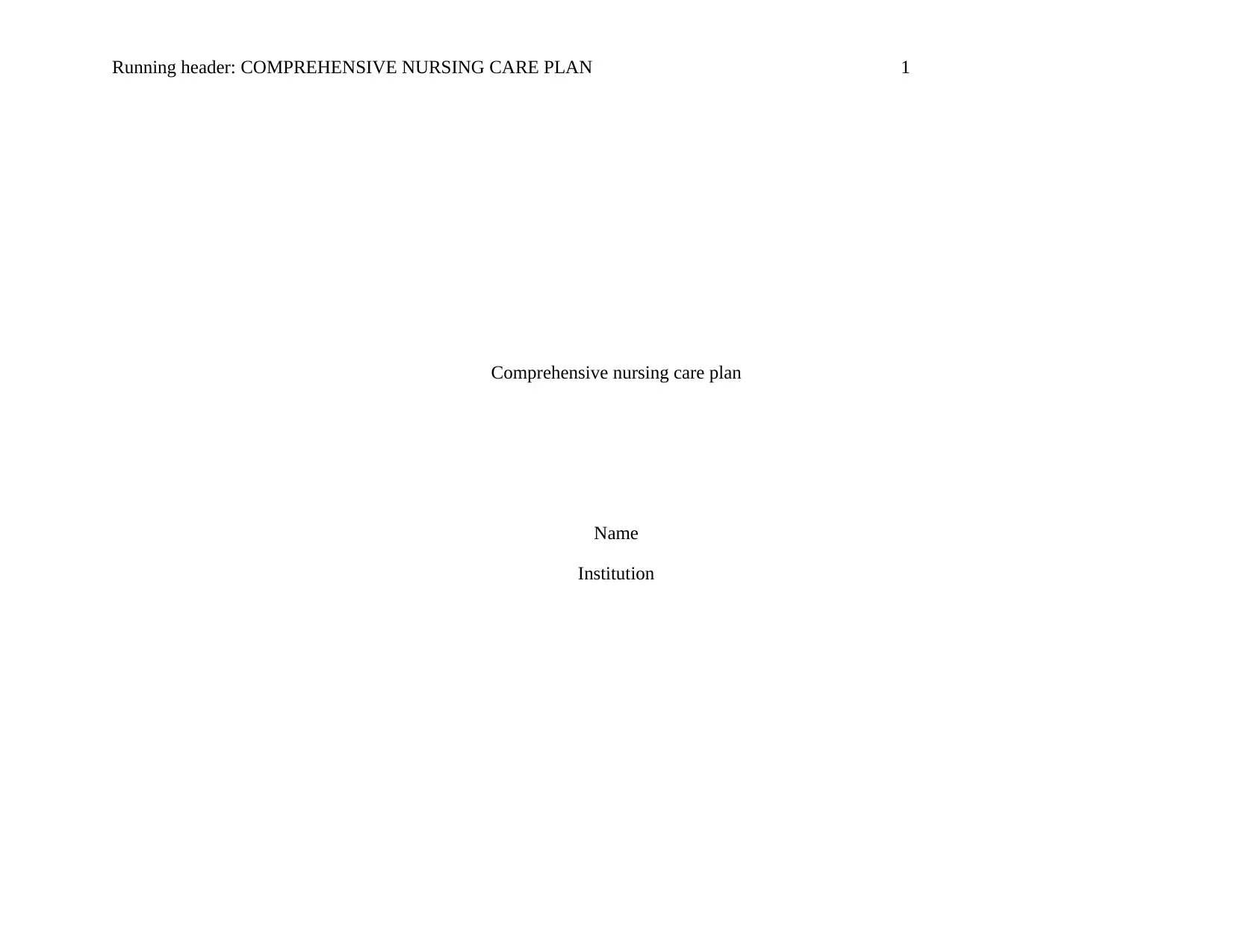
Running header: COMPREHENSIVE NURSING CARE PLAN 1
Comprehensive nursing care plan
Name
Institution
Comprehensive nursing care plan
Name
Institution
Paraphrase This Document
Need a fresh take? Get an instant paraphrase of this document with our AI Paraphraser
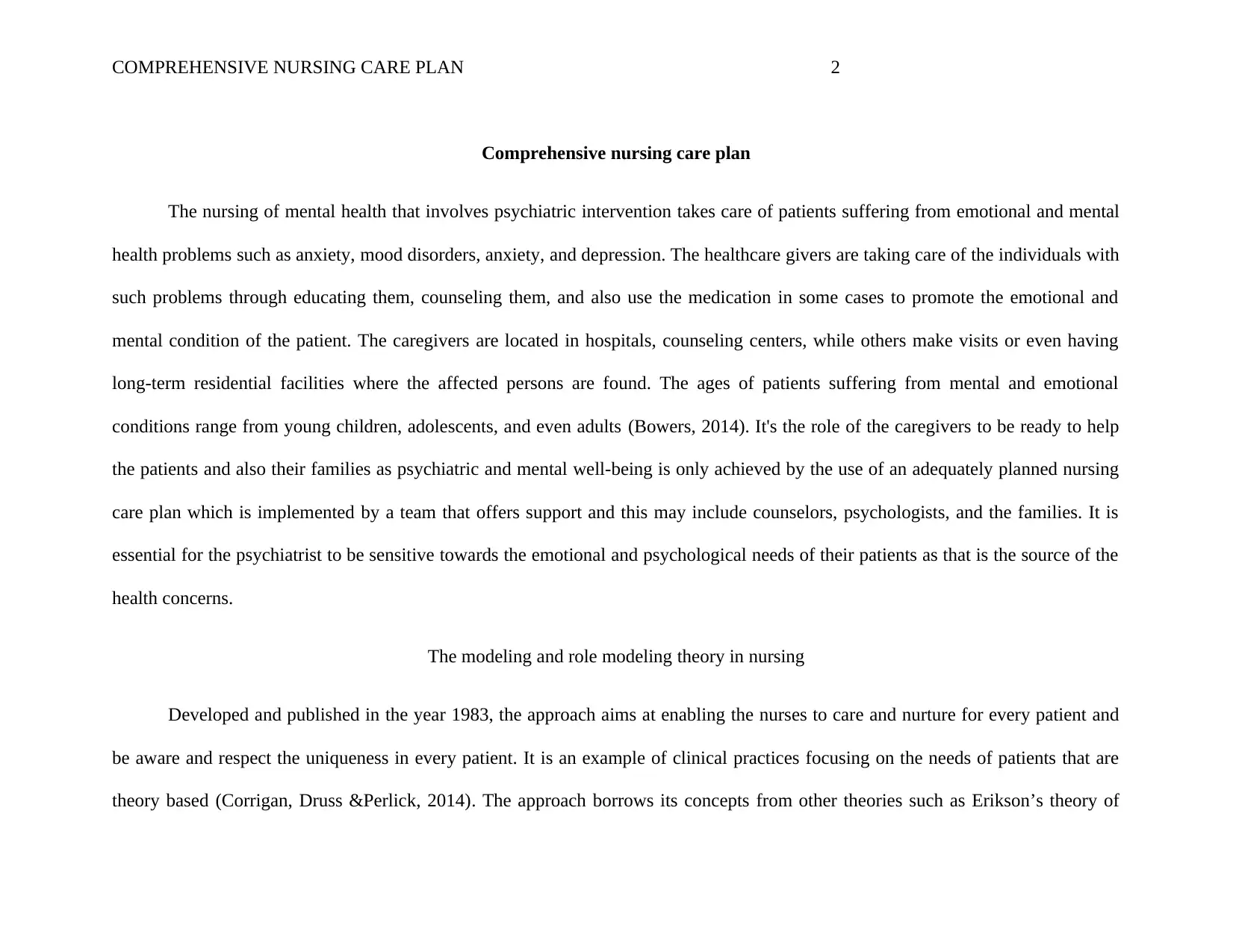
COMPREHENSIVE NURSING CARE PLAN 2
Comprehensive nursing care plan
The nursing of mental health that involves psychiatric intervention takes care of patients suffering from emotional and mental
health problems such as anxiety, mood disorders, anxiety, and depression. The healthcare givers are taking care of the individuals with
such problems through educating them, counseling them, and also use the medication in some cases to promote the emotional and
mental condition of the patient. The caregivers are located in hospitals, counseling centers, while others make visits or even having
long-term residential facilities where the affected persons are found. The ages of patients suffering from mental and emotional
conditions range from young children, adolescents, and even adults (Bowers, 2014). It's the role of the caregivers to be ready to help
the patients and also their families as psychiatric and mental well-being is only achieved by the use of an adequately planned nursing
care plan which is implemented by a team that offers support and this may include counselors, psychologists, and the families. It is
essential for the psychiatrist to be sensitive towards the emotional and psychological needs of their patients as that is the source of the
health concerns.
The modeling and role modeling theory in nursing
Developed and published in the year 1983, the approach aims at enabling the nurses to care and nurture for every patient and
be aware and respect the uniqueness in every patient. It is an example of clinical practices focusing on the needs of patients that are
theory based (Corrigan, Druss &Perlick, 2014). The approach borrows its concepts from other theories such as Erikson’s theory of
Comprehensive nursing care plan
The nursing of mental health that involves psychiatric intervention takes care of patients suffering from emotional and mental
health problems such as anxiety, mood disorders, anxiety, and depression. The healthcare givers are taking care of the individuals with
such problems through educating them, counseling them, and also use the medication in some cases to promote the emotional and
mental condition of the patient. The caregivers are located in hospitals, counseling centers, while others make visits or even having
long-term residential facilities where the affected persons are found. The ages of patients suffering from mental and emotional
conditions range from young children, adolescents, and even adults (Bowers, 2014). It's the role of the caregivers to be ready to help
the patients and also their families as psychiatric and mental well-being is only achieved by the use of an adequately planned nursing
care plan which is implemented by a team that offers support and this may include counselors, psychologists, and the families. It is
essential for the psychiatrist to be sensitive towards the emotional and psychological needs of their patients as that is the source of the
health concerns.
The modeling and role modeling theory in nursing
Developed and published in the year 1983, the approach aims at enabling the nurses to care and nurture for every patient and
be aware and respect the uniqueness in every patient. It is an example of clinical practices focusing on the needs of patients that are
theory based (Corrigan, Druss &Perlick, 2014). The approach borrows its concepts from other theories such as Erikson’s theory of
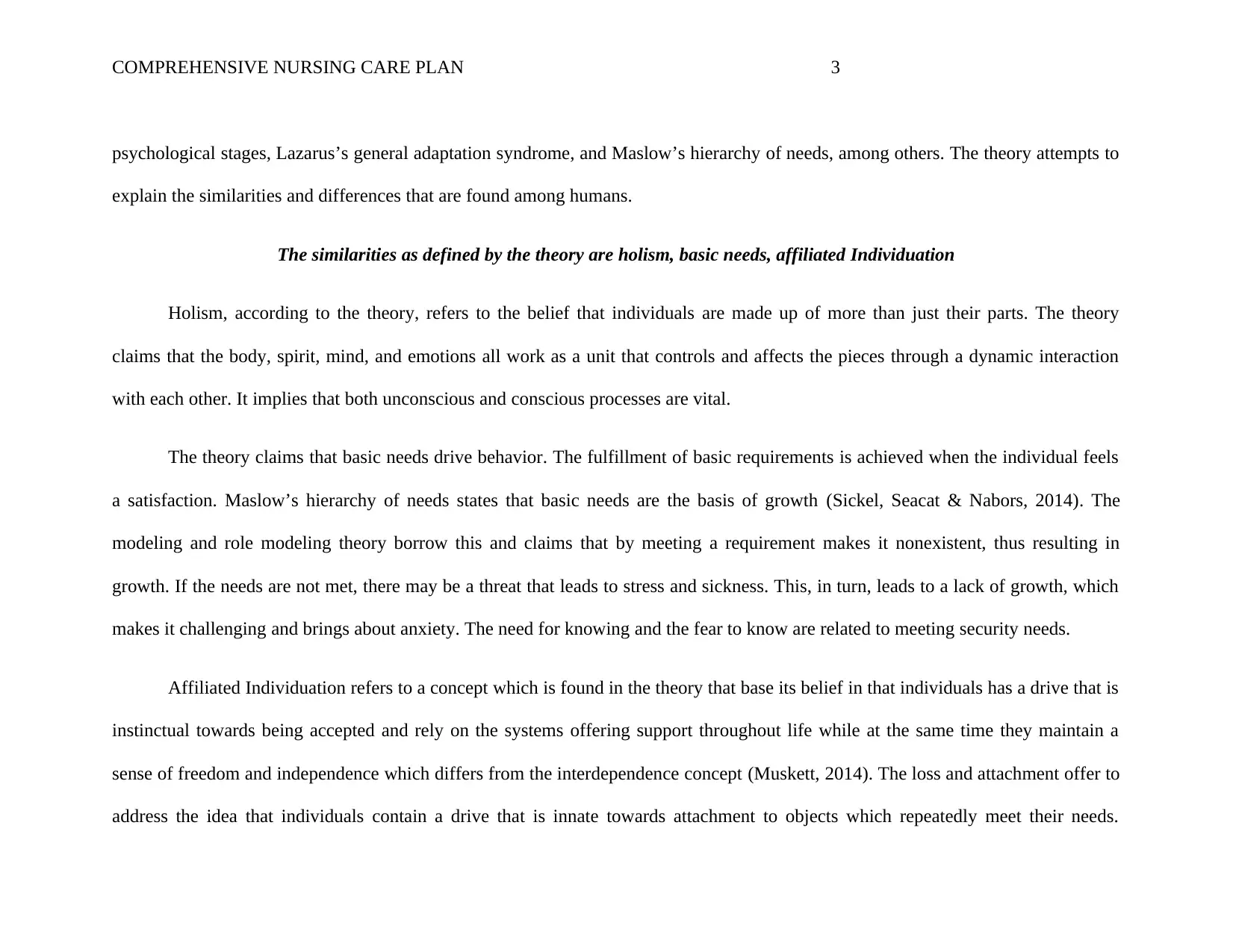
COMPREHENSIVE NURSING CARE PLAN 3
psychological stages, Lazarus’s general adaptation syndrome, and Maslow’s hierarchy of needs, among others. The theory attempts to
explain the similarities and differences that are found among humans.
The similarities as defined by the theory are holism, basic needs, affiliated Individuation
Holism, according to the theory, refers to the belief that individuals are made up of more than just their parts. The theory
claims that the body, spirit, mind, and emotions all work as a unit that controls and affects the pieces through a dynamic interaction
with each other. It implies that both unconscious and conscious processes are vital.
The theory claims that basic needs drive behavior. The fulfillment of basic requirements is achieved when the individual feels
a satisfaction. Maslow’s hierarchy of needs states that basic needs are the basis of growth (Sickel, Seacat & Nabors, 2014). The
modeling and role modeling theory borrow this and claims that by meeting a requirement makes it nonexistent, thus resulting in
growth. If the needs are not met, there may be a threat that leads to stress and sickness. This, in turn, leads to a lack of growth, which
makes it challenging and brings about anxiety. The need for knowing and the fear to know are related to meeting security needs.
Affiliated Individuation refers to a concept which is found in the theory that base its belief in that individuals has a drive that is
instinctual towards being accepted and rely on the systems offering support throughout life while at the same time they maintain a
sense of freedom and independence which differs from the interdependence concept (Muskett, 2014). The loss and attachment offer to
address the idea that individuals contain a drive that is innate towards attachment to objects which repeatedly meet their needs.
psychological stages, Lazarus’s general adaptation syndrome, and Maslow’s hierarchy of needs, among others. The theory attempts to
explain the similarities and differences that are found among humans.
The similarities as defined by the theory are holism, basic needs, affiliated Individuation
Holism, according to the theory, refers to the belief that individuals are made up of more than just their parts. The theory
claims that the body, spirit, mind, and emotions all work as a unit that controls and affects the pieces through a dynamic interaction
with each other. It implies that both unconscious and conscious processes are vital.
The theory claims that basic needs drive behavior. The fulfillment of basic requirements is achieved when the individual feels
a satisfaction. Maslow’s hierarchy of needs states that basic needs are the basis of growth (Sickel, Seacat & Nabors, 2014). The
modeling and role modeling theory borrow this and claims that by meeting a requirement makes it nonexistent, thus resulting in
growth. If the needs are not met, there may be a threat that leads to stress and sickness. This, in turn, leads to a lack of growth, which
makes it challenging and brings about anxiety. The need for knowing and the fear to know are related to meeting security needs.
Affiliated Individuation refers to a concept which is found in the theory that base its belief in that individuals has a drive that is
instinctual towards being accepted and rely on the systems offering support throughout life while at the same time they maintain a
sense of freedom and independence which differs from the interdependence concept (Muskett, 2014). The loss and attachment offer to
address the idea that individuals contain a drive that is innate towards attachment to objects which repeatedly meet their needs.
⊘ This is a preview!⊘
Do you want full access?
Subscribe today to unlock all pages.

Trusted by 1+ million students worldwide
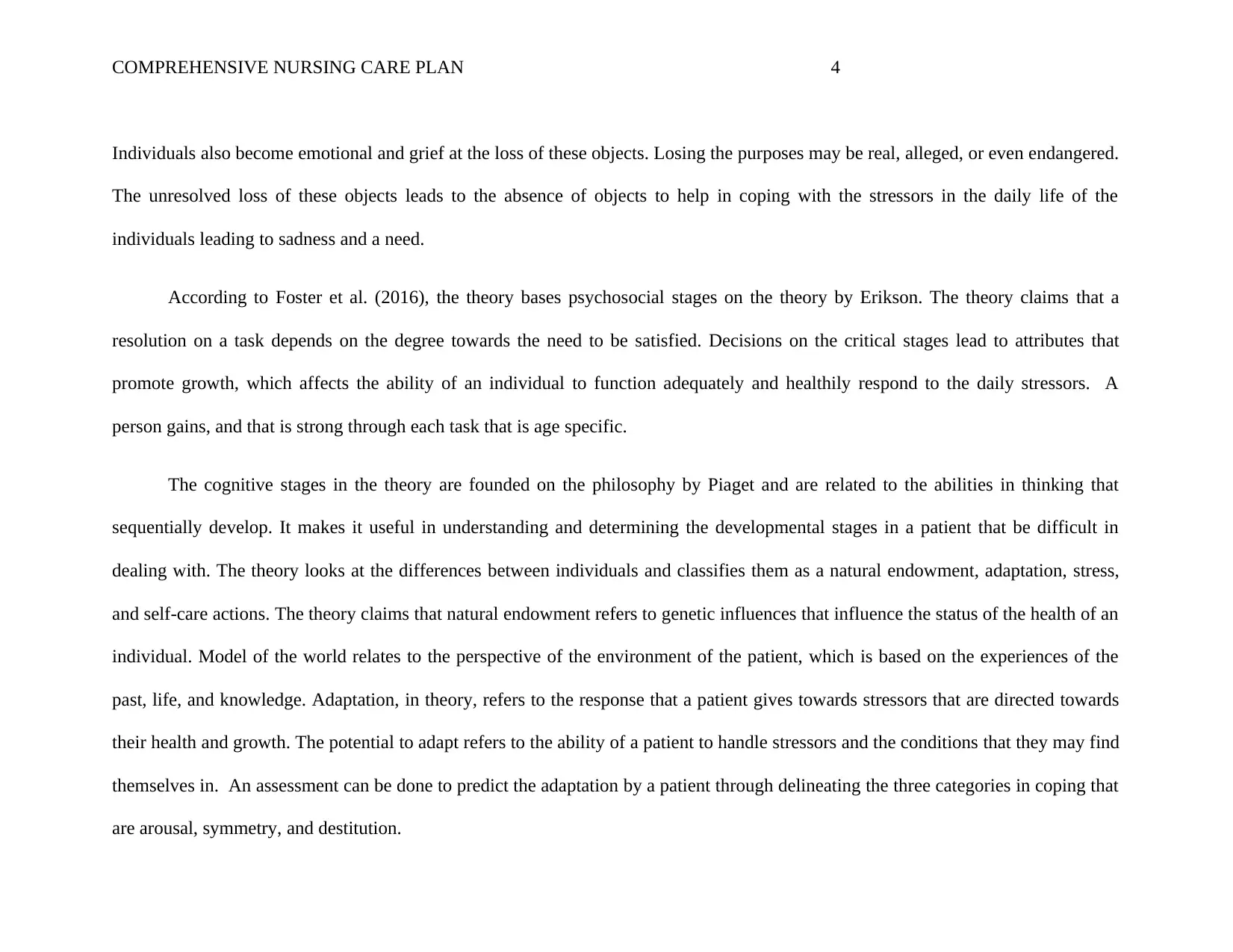
COMPREHENSIVE NURSING CARE PLAN 4
Individuals also become emotional and grief at the loss of these objects. Losing the purposes may be real, alleged, or even endangered.
The unresolved loss of these objects leads to the absence of objects to help in coping with the stressors in the daily life of the
individuals leading to sadness and a need.
According to Foster et al. (2016), the theory bases psychosocial stages on the theory by Erikson. The theory claims that a
resolution on a task depends on the degree towards the need to be satisfied. Decisions on the critical stages lead to attributes that
promote growth, which affects the ability of an individual to function adequately and healthily respond to the daily stressors. A
person gains, and that is strong through each task that is age specific.
The cognitive stages in the theory are founded on the philosophy by Piaget and are related to the abilities in thinking that
sequentially develop. It makes it useful in understanding and determining the developmental stages in a patient that be difficult in
dealing with. The theory looks at the differences between individuals and classifies them as a natural endowment, adaptation, stress,
and self-care actions. The theory claims that natural endowment refers to genetic influences that influence the status of the health of an
individual. Model of the world relates to the perspective of the environment of the patient, which is based on the experiences of the
past, life, and knowledge. Adaptation, in theory, refers to the response that a patient gives towards stressors that are directed towards
their health and growth. The potential to adapt refers to the ability of a patient to handle stressors and the conditions that they may find
themselves in. An assessment can be done to predict the adaptation by a patient through delineating the three categories in coping that
are arousal, symmetry, and destitution.
Individuals also become emotional and grief at the loss of these objects. Losing the purposes may be real, alleged, or even endangered.
The unresolved loss of these objects leads to the absence of objects to help in coping with the stressors in the daily life of the
individuals leading to sadness and a need.
According to Foster et al. (2016), the theory bases psychosocial stages on the theory by Erikson. The theory claims that a
resolution on a task depends on the degree towards the need to be satisfied. Decisions on the critical stages lead to attributes that
promote growth, which affects the ability of an individual to function adequately and healthily respond to the daily stressors. A
person gains, and that is strong through each task that is age specific.
The cognitive stages in the theory are founded on the philosophy by Piaget and are related to the abilities in thinking that
sequentially develop. It makes it useful in understanding and determining the developmental stages in a patient that be difficult in
dealing with. The theory looks at the differences between individuals and classifies them as a natural endowment, adaptation, stress,
and self-care actions. The theory claims that natural endowment refers to genetic influences that influence the status of the health of an
individual. Model of the world relates to the perspective of the environment of the patient, which is based on the experiences of the
past, life, and knowledge. Adaptation, in theory, refers to the response that a patient gives towards stressors that are directed towards
their health and growth. The potential to adapt refers to the ability of a patient to handle stressors and the conditions that they may find
themselves in. An assessment can be done to predict the adaptation by a patient through delineating the three categories in coping that
are arousal, symmetry, and destitution.
Paraphrase This Document
Need a fresh take? Get an instant paraphrase of this document with our AI Paraphraser
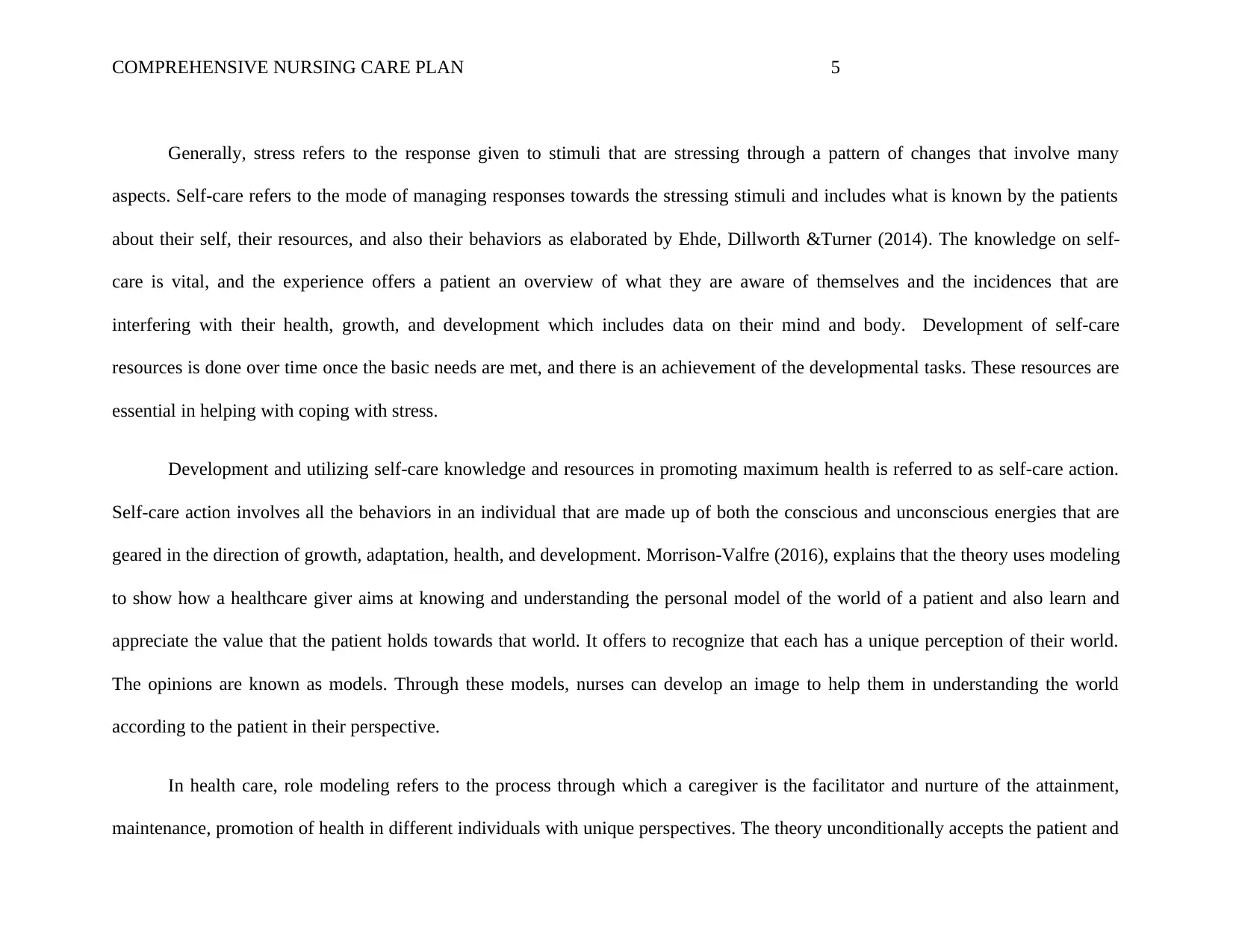
COMPREHENSIVE NURSING CARE PLAN 5
Generally, stress refers to the response given to stimuli that are stressing through a pattern of changes that involve many
aspects. Self-care refers to the mode of managing responses towards the stressing stimuli and includes what is known by the patients
about their self, their resources, and also their behaviors as elaborated by Ehde, Dillworth &Turner (2014). The knowledge on self-
care is vital, and the experience offers a patient an overview of what they are aware of themselves and the incidences that are
interfering with their health, growth, and development which includes data on their mind and body. Development of self-care
resources is done over time once the basic needs are met, and there is an achievement of the developmental tasks. These resources are
essential in helping with coping with stress.
Development and utilizing self-care knowledge and resources in promoting maximum health is referred to as self-care action.
Self-care action involves all the behaviors in an individual that are made up of both the conscious and unconscious energies that are
geared in the direction of growth, adaptation, health, and development. Morrison-Valfre (2016), explains that the theory uses modeling
to show how a healthcare giver aims at knowing and understanding the personal model of the world of a patient and also learn and
appreciate the value that the patient holds towards that world. It offers to recognize that each has a unique perception of their world.
The opinions are known as models. Through these models, nurses can develop an image to help them in understanding the world
according to the patient in their perspective.
In health care, role modeling refers to the process through which a caregiver is the facilitator and nurture of the attainment,
maintenance, promotion of health in different individuals with unique perspectives. The theory unconditionally accepts the patient and
Generally, stress refers to the response given to stimuli that are stressing through a pattern of changes that involve many
aspects. Self-care refers to the mode of managing responses towards the stressing stimuli and includes what is known by the patients
about their self, their resources, and also their behaviors as elaborated by Ehde, Dillworth &Turner (2014). The knowledge on self-
care is vital, and the experience offers a patient an overview of what they are aware of themselves and the incidences that are
interfering with their health, growth, and development which includes data on their mind and body. Development of self-care
resources is done over time once the basic needs are met, and there is an achievement of the developmental tasks. These resources are
essential in helping with coping with stress.
Development and utilizing self-care knowledge and resources in promoting maximum health is referred to as self-care action.
Self-care action involves all the behaviors in an individual that are made up of both the conscious and unconscious energies that are
geared in the direction of growth, adaptation, health, and development. Morrison-Valfre (2016), explains that the theory uses modeling
to show how a healthcare giver aims at knowing and understanding the personal model of the world of a patient and also learn and
appreciate the value that the patient holds towards that world. It offers to recognize that each has a unique perception of their world.
The opinions are known as models. Through these models, nurses can develop an image to help them in understanding the world
according to the patient in their perspective.
In health care, role modeling refers to the process through which a caregiver is the facilitator and nurture of the attainment,
maintenance, promotion of health in different individuals with unique perspectives. The theory unconditionally accepts the patient and
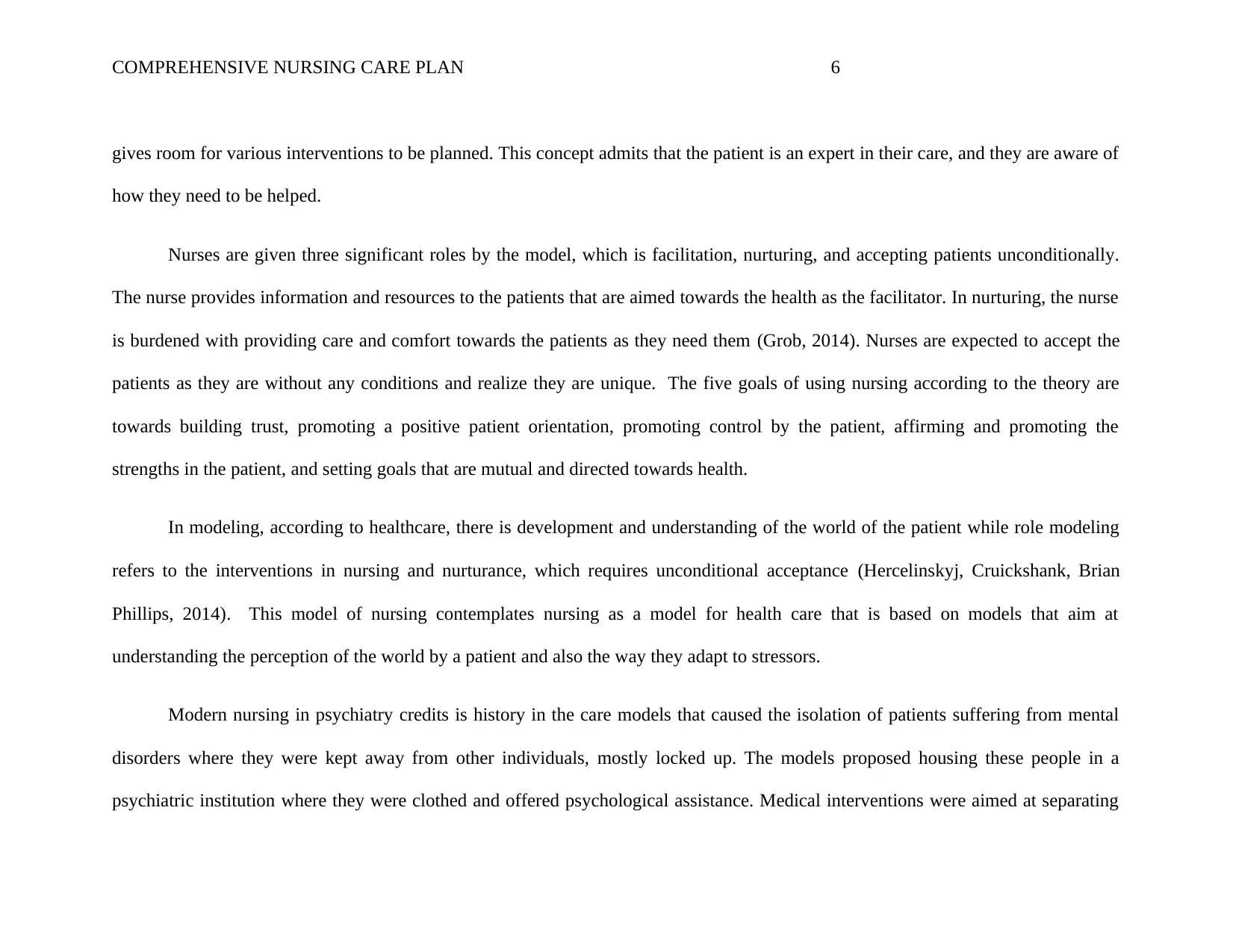
COMPREHENSIVE NURSING CARE PLAN 6
gives room for various interventions to be planned. This concept admits that the patient is an expert in their care, and they are aware of
how they need to be helped.
Nurses are given three significant roles by the model, which is facilitation, nurturing, and accepting patients unconditionally.
The nurse provides information and resources to the patients that are aimed towards the health as the facilitator. In nurturing, the nurse
is burdened with providing care and comfort towards the patients as they need them (Grob, 2014). Nurses are expected to accept the
patients as they are without any conditions and realize they are unique. The five goals of using nursing according to the theory are
towards building trust, promoting a positive patient orientation, promoting control by the patient, affirming and promoting the
strengths in the patient, and setting goals that are mutual and directed towards health.
In modeling, according to healthcare, there is development and understanding of the world of the patient while role modeling
refers to the interventions in nursing and nurturance, which requires unconditional acceptance (Hercelinskyj, Cruickshank, Brian
Phillips, 2014). This model of nursing contemplates nursing as a model for health care that is based on models that aim at
understanding the perception of the world by a patient and also the way they adapt to stressors.
Modern nursing in psychiatry credits is history in the care models that caused the isolation of patients suffering from mental
disorders where they were kept away from other individuals, mostly locked up. The models proposed housing these people in a
psychiatric institution where they were clothed and offered psychological assistance. Medical interventions were aimed at separating
gives room for various interventions to be planned. This concept admits that the patient is an expert in their care, and they are aware of
how they need to be helped.
Nurses are given three significant roles by the model, which is facilitation, nurturing, and accepting patients unconditionally.
The nurse provides information and resources to the patients that are aimed towards the health as the facilitator. In nurturing, the nurse
is burdened with providing care and comfort towards the patients as they need them (Grob, 2014). Nurses are expected to accept the
patients as they are without any conditions and realize they are unique. The five goals of using nursing according to the theory are
towards building trust, promoting a positive patient orientation, promoting control by the patient, affirming and promoting the
strengths in the patient, and setting goals that are mutual and directed towards health.
In modeling, according to healthcare, there is development and understanding of the world of the patient while role modeling
refers to the interventions in nursing and nurturance, which requires unconditional acceptance (Hercelinskyj, Cruickshank, Brian
Phillips, 2014). This model of nursing contemplates nursing as a model for health care that is based on models that aim at
understanding the perception of the world by a patient and also the way they adapt to stressors.
Modern nursing in psychiatry credits is history in the care models that caused the isolation of patients suffering from mental
disorders where they were kept away from other individuals, mostly locked up. The models proposed housing these people in a
psychiatric institution where they were clothed and offered psychological assistance. Medical interventions were aimed at separating
⊘ This is a preview!⊘
Do you want full access?
Subscribe today to unlock all pages.

Trusted by 1+ million students worldwide
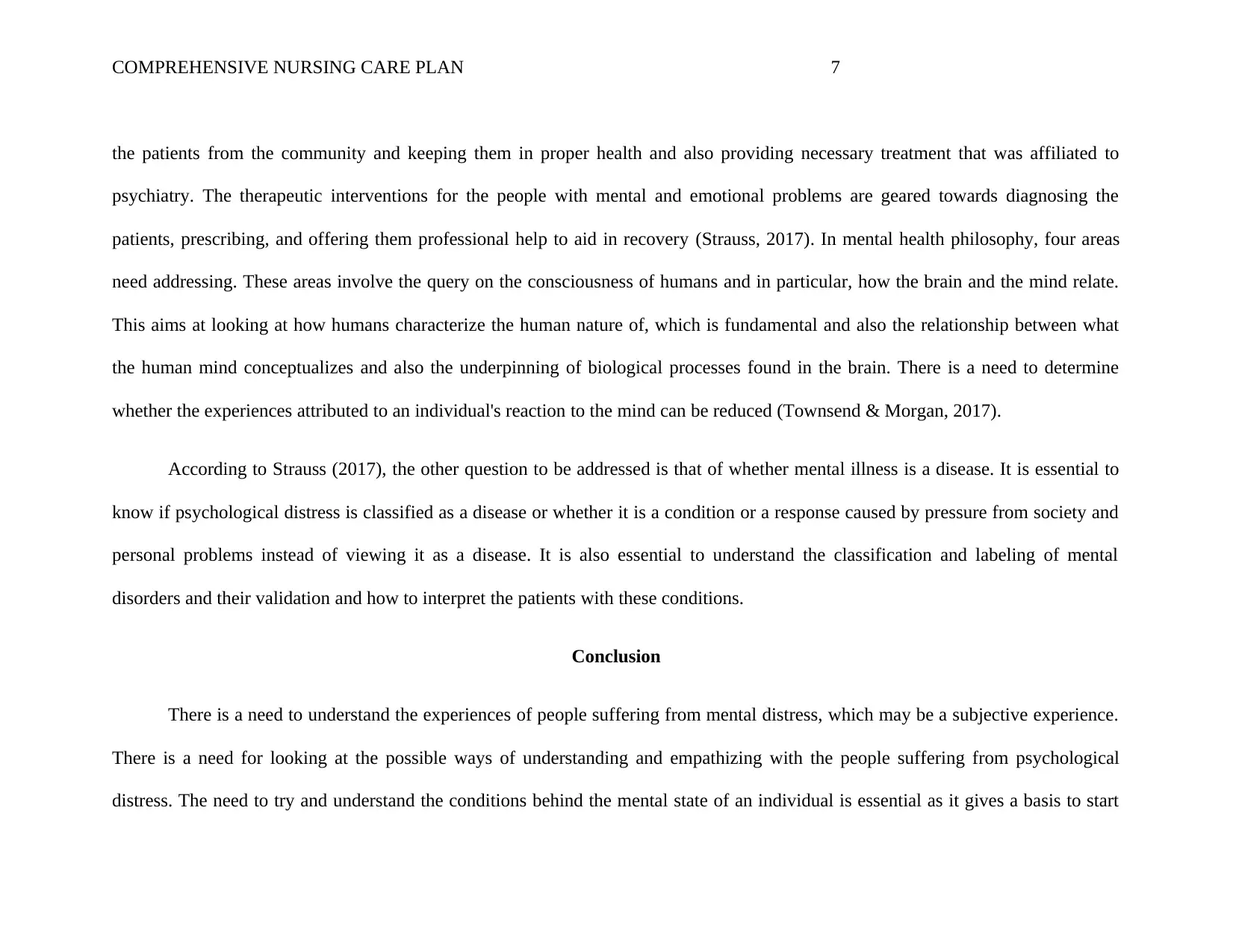
COMPREHENSIVE NURSING CARE PLAN 7
the patients from the community and keeping them in proper health and also providing necessary treatment that was affiliated to
psychiatry. The therapeutic interventions for the people with mental and emotional problems are geared towards diagnosing the
patients, prescribing, and offering them professional help to aid in recovery (Strauss, 2017). In mental health philosophy, four areas
need addressing. These areas involve the query on the consciousness of humans and in particular, how the brain and the mind relate.
This aims at looking at how humans characterize the human nature of, which is fundamental and also the relationship between what
the human mind conceptualizes and also the underpinning of biological processes found in the brain. There is a need to determine
whether the experiences attributed to an individual's reaction to the mind can be reduced (Townsend & Morgan, 2017).
According to Strauss (2017), the other question to be addressed is that of whether mental illness is a disease. It is essential to
know if psychological distress is classified as a disease or whether it is a condition or a response caused by pressure from society and
personal problems instead of viewing it as a disease. It is also essential to understand the classification and labeling of mental
disorders and their validation and how to interpret the patients with these conditions.
Conclusion
There is a need to understand the experiences of people suffering from mental distress, which may be a subjective experience.
There is a need for looking at the possible ways of understanding and empathizing with the people suffering from psychological
distress. The need to try and understand the conditions behind the mental state of an individual is essential as it gives a basis to start
the patients from the community and keeping them in proper health and also providing necessary treatment that was affiliated to
psychiatry. The therapeutic interventions for the people with mental and emotional problems are geared towards diagnosing the
patients, prescribing, and offering them professional help to aid in recovery (Strauss, 2017). In mental health philosophy, four areas
need addressing. These areas involve the query on the consciousness of humans and in particular, how the brain and the mind relate.
This aims at looking at how humans characterize the human nature of, which is fundamental and also the relationship between what
the human mind conceptualizes and also the underpinning of biological processes found in the brain. There is a need to determine
whether the experiences attributed to an individual's reaction to the mind can be reduced (Townsend & Morgan, 2017).
According to Strauss (2017), the other question to be addressed is that of whether mental illness is a disease. It is essential to
know if psychological distress is classified as a disease or whether it is a condition or a response caused by pressure from society and
personal problems instead of viewing it as a disease. It is also essential to understand the classification and labeling of mental
disorders and their validation and how to interpret the patients with these conditions.
Conclusion
There is a need to understand the experiences of people suffering from mental distress, which may be a subjective experience.
There is a need for looking at the possible ways of understanding and empathizing with the people suffering from psychological
distress. The need to try and understand the conditions behind the mental state of an individual is essential as it gives a basis to start
Paraphrase This Document
Need a fresh take? Get an instant paraphrase of this document with our AI Paraphraser
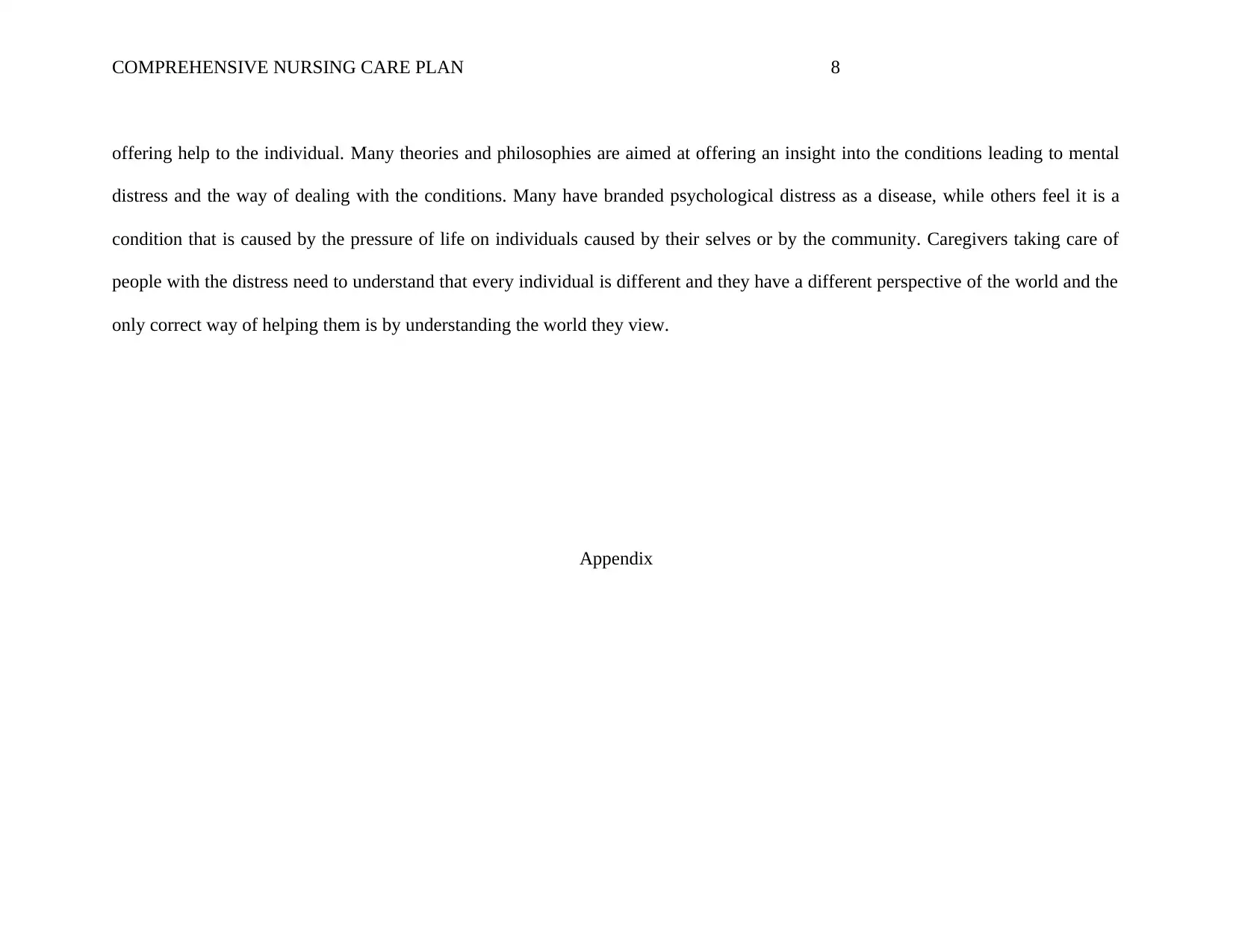
COMPREHENSIVE NURSING CARE PLAN 8
offering help to the individual. Many theories and philosophies are aimed at offering an insight into the conditions leading to mental
distress and the way of dealing with the conditions. Many have branded psychological distress as a disease, while others feel it is a
condition that is caused by the pressure of life on individuals caused by their selves or by the community. Caregivers taking care of
people with the distress need to understand that every individual is different and they have a different perspective of the world and the
only correct way of helping them is by understanding the world they view.
Appendix
offering help to the individual. Many theories and philosophies are aimed at offering an insight into the conditions leading to mental
distress and the way of dealing with the conditions. Many have branded psychological distress as a disease, while others feel it is a
condition that is caused by the pressure of life on individuals caused by their selves or by the community. Caregivers taking care of
people with the distress need to understand that every individual is different and they have a different perspective of the world and the
only correct way of helping them is by understanding the world they view.
Appendix
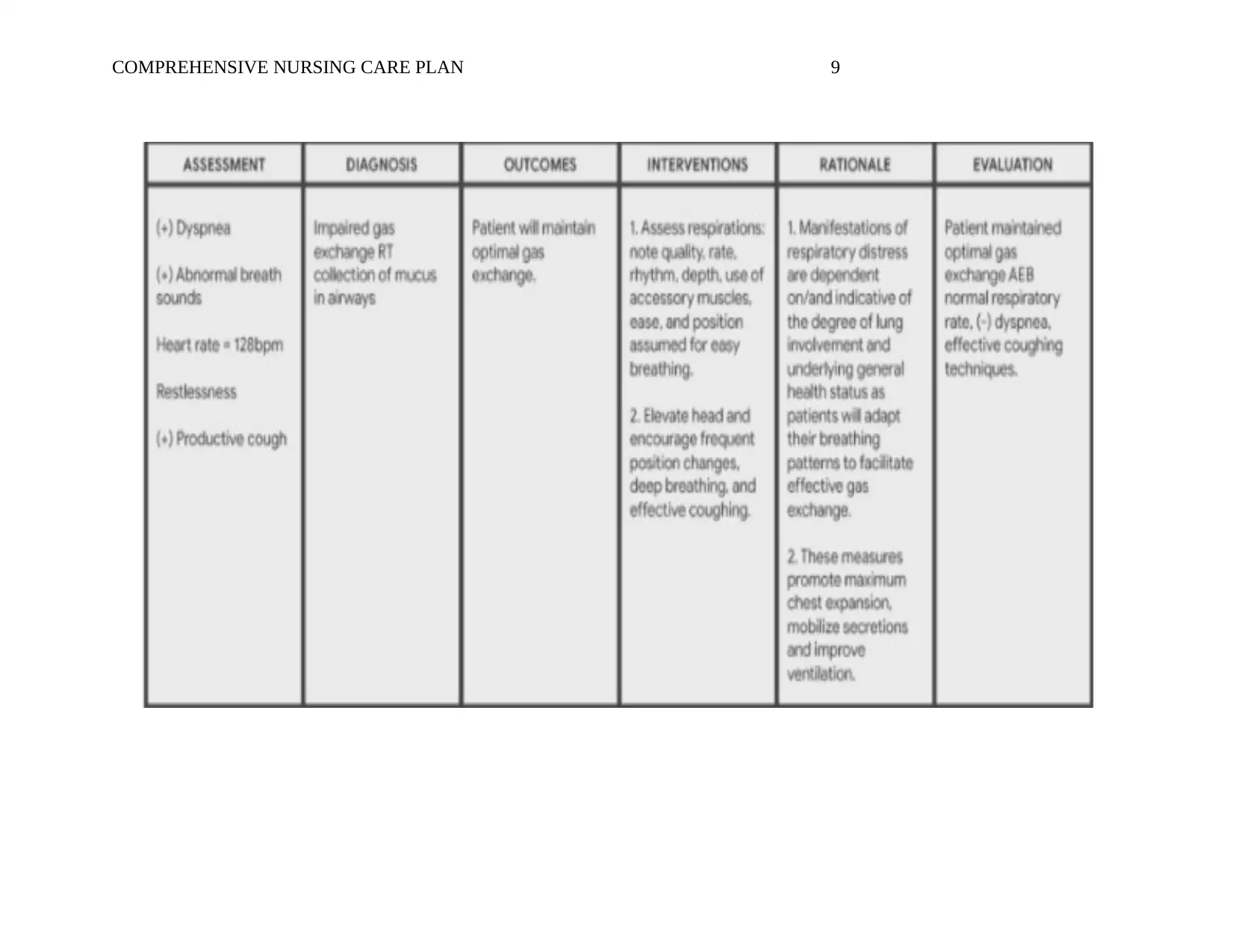
COMPREHENSIVE NURSING CARE PLAN 9
⊘ This is a preview!⊘
Do you want full access?
Subscribe today to unlock all pages.

Trusted by 1+ million students worldwide
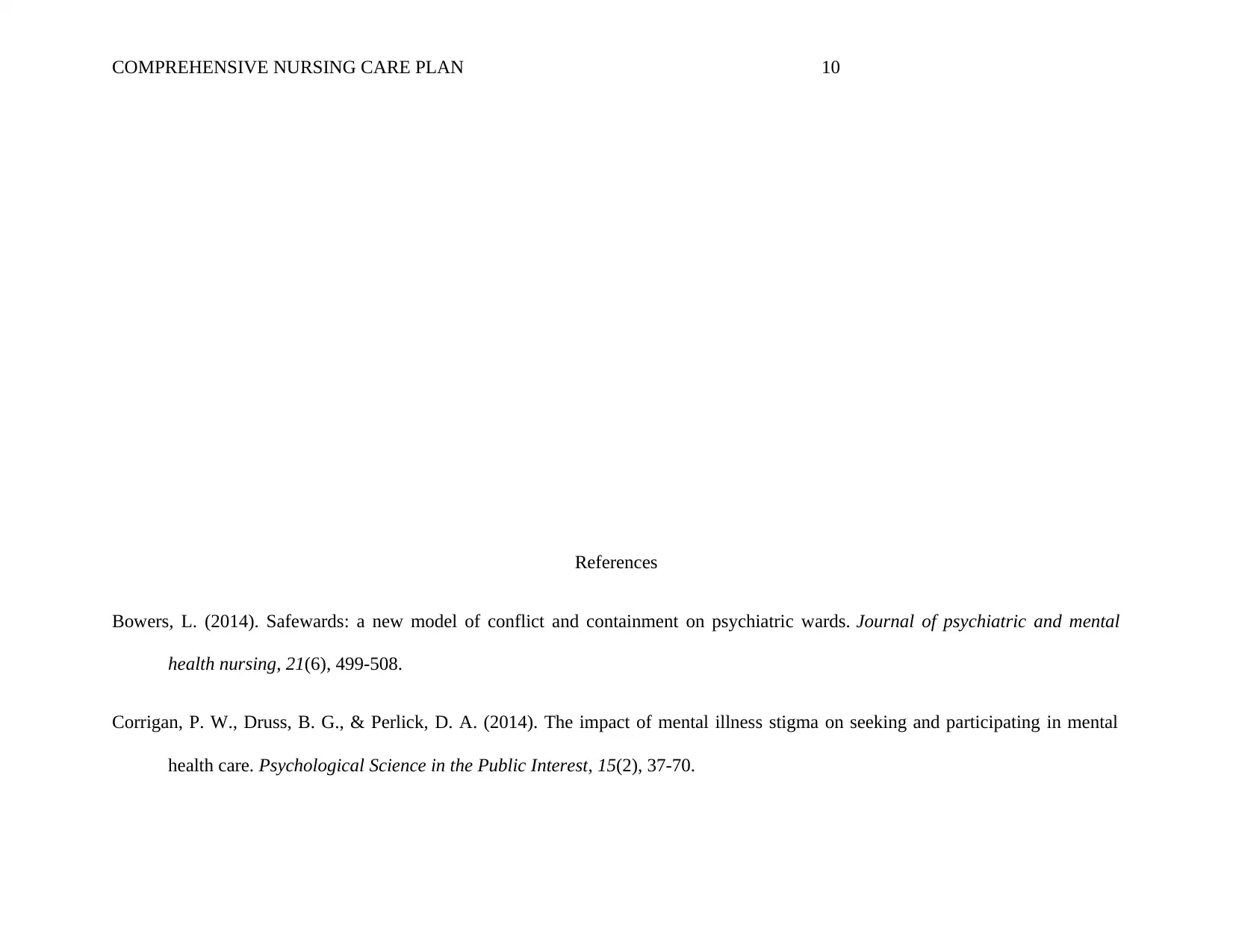
COMPREHENSIVE NURSING CARE PLAN 10
References
Bowers, L. (2014). Safewards: a new model of conflict and containment on psychiatric wards. Journal of psychiatric and mental
health nursing, 21(6), 499-508.
Corrigan, P. W., Druss, B. G., & Perlick, D. A. (2014). The impact of mental illness stigma on seeking and participating in mental
health care. Psychological Science in the Public Interest, 15(2), 37-70.
References
Bowers, L. (2014). Safewards: a new model of conflict and containment on psychiatric wards. Journal of psychiatric and mental
health nursing, 21(6), 499-508.
Corrigan, P. W., Druss, B. G., & Perlick, D. A. (2014). The impact of mental illness stigma on seeking and participating in mental
health care. Psychological Science in the Public Interest, 15(2), 37-70.
Paraphrase This Document
Need a fresh take? Get an instant paraphrase of this document with our AI Paraphraser
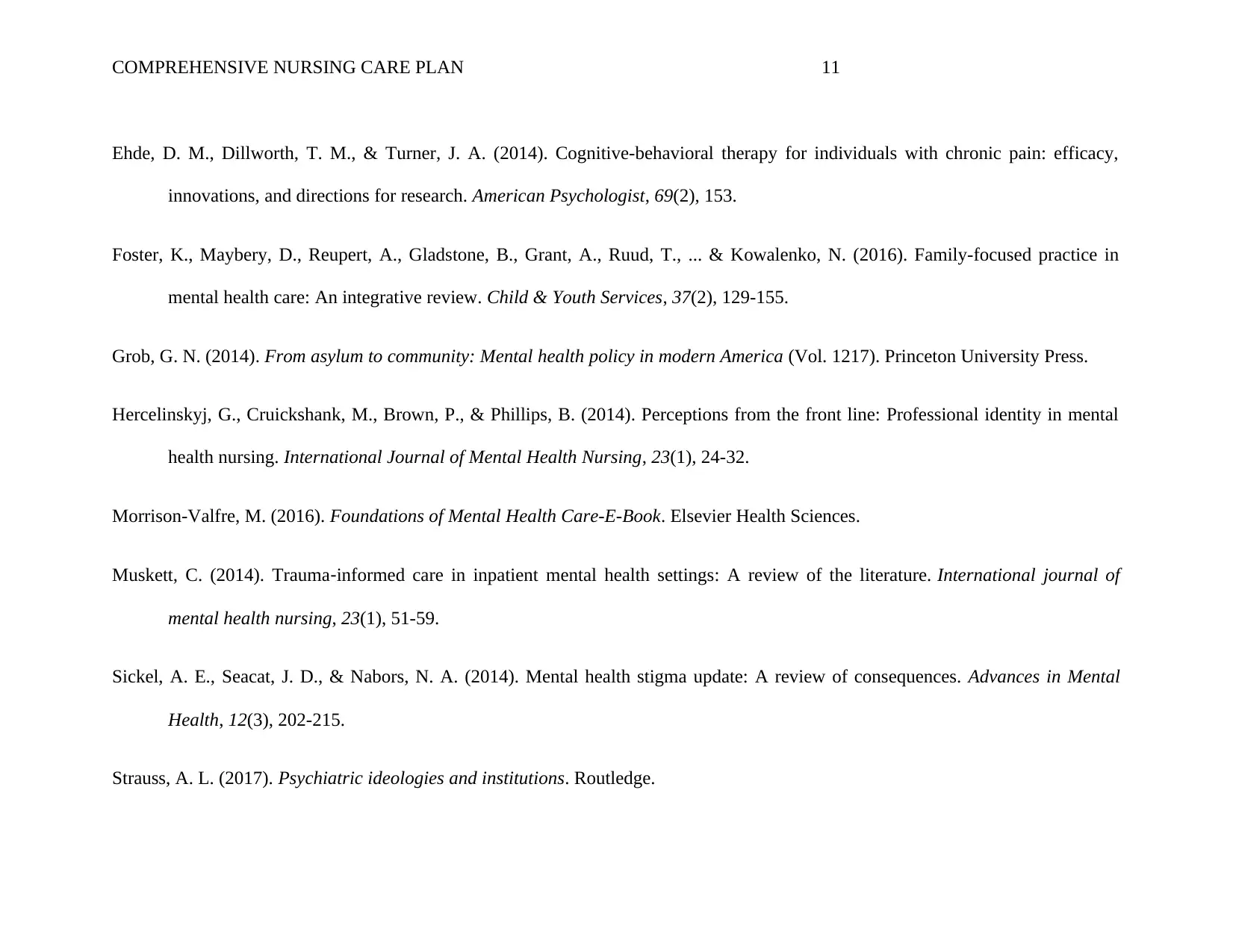
COMPREHENSIVE NURSING CARE PLAN 11
Ehde, D. M., Dillworth, T. M., & Turner, J. A. (2014). Cognitive-behavioral therapy for individuals with chronic pain: efficacy,
innovations, and directions for research. American Psychologist, 69(2), 153.
Foster, K., Maybery, D., Reupert, A., Gladstone, B., Grant, A., Ruud, T., ... & Kowalenko, N. (2016). Family-focused practice in
mental health care: An integrative review. Child & Youth Services, 37(2), 129-155.
Grob, G. N. (2014). From asylum to community: Mental health policy in modern America (Vol. 1217). Princeton University Press.
Hercelinskyj, G., Cruickshank, M., Brown, P., & Phillips, B. (2014). Perceptions from the front line: Professional identity in mental
health nursing. International Journal of Mental Health Nursing, 23(1), 24-32.
Morrison-Valfre, M. (2016). Foundations of Mental Health Care-E-Book. Elsevier Health Sciences.
Muskett, C. (2014). Trauma‐informed care in inpatient mental health settings: A review of the literature. International journal of
mental health nursing, 23(1), 51-59.
Sickel, A. E., Seacat, J. D., & Nabors, N. A. (2014). Mental health stigma update: A review of consequences. Advances in Mental
Health, 12(3), 202-215.
Strauss, A. L. (2017). Psychiatric ideologies and institutions. Routledge.
Ehde, D. M., Dillworth, T. M., & Turner, J. A. (2014). Cognitive-behavioral therapy for individuals with chronic pain: efficacy,
innovations, and directions for research. American Psychologist, 69(2), 153.
Foster, K., Maybery, D., Reupert, A., Gladstone, B., Grant, A., Ruud, T., ... & Kowalenko, N. (2016). Family-focused practice in
mental health care: An integrative review. Child & Youth Services, 37(2), 129-155.
Grob, G. N. (2014). From asylum to community: Mental health policy in modern America (Vol. 1217). Princeton University Press.
Hercelinskyj, G., Cruickshank, M., Brown, P., & Phillips, B. (2014). Perceptions from the front line: Professional identity in mental
health nursing. International Journal of Mental Health Nursing, 23(1), 24-32.
Morrison-Valfre, M. (2016). Foundations of Mental Health Care-E-Book. Elsevier Health Sciences.
Muskett, C. (2014). Trauma‐informed care in inpatient mental health settings: A review of the literature. International journal of
mental health nursing, 23(1), 51-59.
Sickel, A. E., Seacat, J. D., & Nabors, N. A. (2014). Mental health stigma update: A review of consequences. Advances in Mental
Health, 12(3), 202-215.
Strauss, A. L. (2017). Psychiatric ideologies and institutions. Routledge.
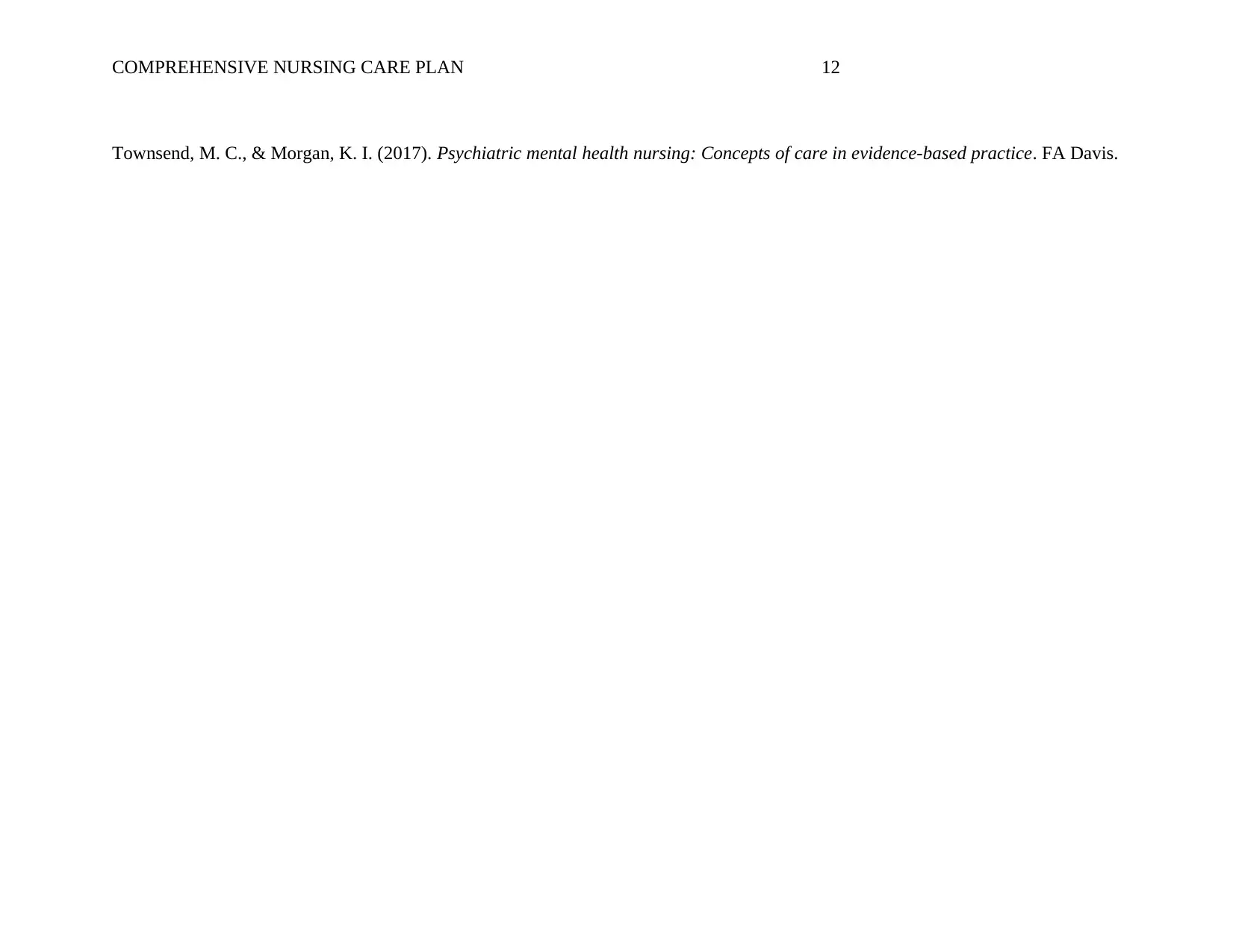
COMPREHENSIVE NURSING CARE PLAN 12
Townsend, M. C., & Morgan, K. I. (2017). Psychiatric mental health nursing: Concepts of care in evidence-based practice. FA Davis.
Townsend, M. C., & Morgan, K. I. (2017). Psychiatric mental health nursing: Concepts of care in evidence-based practice. FA Davis.
⊘ This is a preview!⊘
Do you want full access?
Subscribe today to unlock all pages.

Trusted by 1+ million students worldwide
1 out of 12
Related Documents
Your All-in-One AI-Powered Toolkit for Academic Success.
+13062052269
info@desklib.com
Available 24*7 on WhatsApp / Email
![[object Object]](/_next/static/media/star-bottom.7253800d.svg)
Unlock your academic potential
Copyright © 2020–2026 A2Z Services. All Rights Reserved. Developed and managed by ZUCOL.





